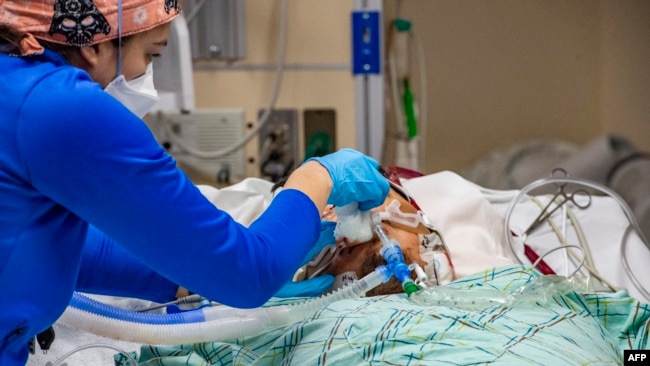コロナ、再感染が招くリスクの恐怖
一度感染しても、ワクチン接種していてもダメ!!
再感染のリスク!!怖いですね!!!
どうしたらいいのでしょうか?
その対策とは?
VOAで英語を学びましょう!!
研究結果: COVIDの反復感染のリスクは初回感染よりも高いことが判明(和訳)
Study: Repeat COVID Infection Is Riskier than First
November 21, 2022
COVID-19による死亡、入院、重篤な健康問題のリスクは、ワクチン接種にかかわらず再感染により増加することが、新たな研究で明らかになりました。
この研究は、2020年3月1日から2022年4月6日までに収集されたU.S. Department of Veterans Affairs米国退役軍人省のデータを調査したものです。SARS-CoV-2に1回感染した患者44万3588人、2回以上感染した患者4万947人、感染していない患者530万人の情報を含んでいます。研究対象者の多くは男性でした。
「COVID-19にReinfection再感染すると、acute outcomes急性転帰と長期COVIDの両方のリスクが高まります」と、セントルイスのワシントン大学医学部のジヤド・アル−アリ博士は言います。彼は、このことは "ワクチン未接種者、ワクチン接種者、ブースト者において "明らかであると付け加えます。
※outcome:治療や予防などの医学的介入から得られるすべての結末のこと。
アウトカム outcome - 一般社団法人 日本理学療法学会連合
再感染者は、一度だけ感染した人と比べて、死亡リスクが2倍、入院リスクが3倍になりました。また、再感染者は他の多くの健康問題のリスクも増加することが、Nature Medicine誌に報告されました。これらの問題は、肺、心臓、血液、腎臓、骨、筋肉に影響を及ぼします。再感染は、精神疾患、脳疾患、神経疾患のリスクも増加しました。
「たとえ、以前に感染し、ワクチンを接種していたとしても、つまり、以前の感染とワクチンによる二重の免疫を持っていたとしても、再感染するとadverse有害な結果を招きやすいのです」とアル−アリ氏は述べます。彼はこの研究の主執筆者です。
Susceptibleとは、何かの影響を受けやすい、あるいは害を受けやすいという意味です。
感染を繰り返す人は、肺の病気になる可能性が3倍、心臓の病気になる可能性が3倍、脳や神経の障害になる可能性が60%高いことが分りました。リスクは再感染後の最初の1カ月が最も高かったのですが、6カ月後にも明らかでした。
デルタ、オミクロン、BA.5などのCOVID-19の変異体の違いを調べた後でも、感染を繰り返すと総リスクは増加した、と研究者は述べています。
「無敵のような雰囲気で診療所を訪れる多くの患者を私たちは見るようになっていました。」とアル−アリ氏はReuters誌に言っています。「彼らは、『再感染することは本当に問題なことなのだろうか?』と考えていました。答えはイエス、絶対にイエスです。」
彼は、旅行や屋内での集まりが多い季節を前に、再感染が深刻であることを認識し、感染を避けるための対策をとるべきだと付け加えまています。
アル−アリ氏は、研究者が深刻な対策を提案しているわけではないと説明し、"飛行機に乗るなら、マスクをつけるとか"。あるいは、食品店にいる人は、"近くにいる人の免疫力が弱いかもしれないと考え、マスクをすれば、その人を守ることができるかもしれません。"と述べています。
Study: Repeat COVID Infection Is Riskier than First
A new study has found that the risk of death, hospitalization and serious health issues from COVID-19 increases with reinfection regardless of vaccination.
The study examined U.S. Department of Veterans Affairs data collected from March 1, 2020 through April 6, 2022. It included information on 443,588 patients with one SARS-CoV-2 infection, 40,947 with two or more infections, and 5.3 million who were not infected. Most of the study subjects were male.
"Reinfection with COVID-19 increases the risk of both acute outcomes and long COVID," said Dr. Ziyad Al-Aly of Washington University School of Medicine in St. Louis. He added that this was clear “in unvaccinated, vaccinated and boosted people."
Reinfected patients had a doubled risk of death and a tripled risk of hospitalization compared with individuals infected only once. The patients also had increased risks for a number of other health problems, the study, reported in Nature Medicine, found. The problems affected the lungs, heart, blood, kidneys, bones and muscles. Reinfection also increased the risk of mental health, brain and nerve disorders.
"Even if one had prior infection and was vaccinated - meaning they had double immunity from prior infection plus vaccines - they are still susceptible to adverse outcomes upon reinfection," said Al-Aly. He was the lead writer of the study.
Susceptible means easily affected or harmed by something.
People with repeat infections were three times more likely to develop lung problems, three times more likely to suffer heart conditions and 60 percent more likely to have brain or nerve disorders, the study found. The risks were highest in the first month after reinfection but were still clear six months later.
The total risks of repeat infection increased with the number of infections, even after examining differences in COVID-19 variants such as Delta, Omicron and BA.5, the researchers said.
"We had started seeing a lot of patients coming to the clinic with an air of invincibility," Al-Aly told Reuters. "They wondered, 'Does getting a reinfection really matter?' The answer is yes, it absolutely does."
He added that ahead of a season that often involves travel and indoor gatherings, people should be aware that reinfection is serious and should take steps to avoid getting infected.
Al-Aly explained that researchers are not suggesting serious measures, "but maybe if you're going on a plane, wear a mask.” Or, if a person is in a food store, "consider that the person near you may have a weak immune system, and if you wear a mask you might help to protect them," he said.
Words in This Story
acute – adj. very serious or dangerous : requiring serious attention or action
prior – adj. existing or happening before the present time
adverse – adj. bad or unfavorable : not good
invincibility – n. impossible to defeat or overcome
immune – adj. relating to the way your body fights disease

